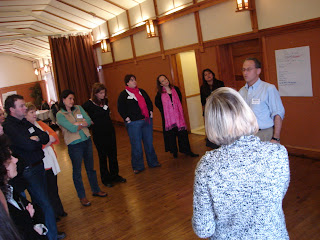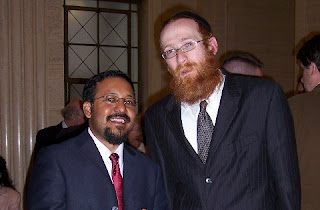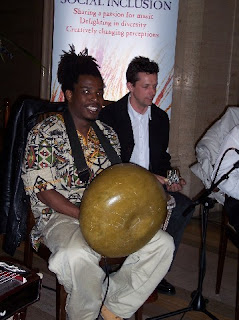
By Chaminda WEERAWARDHANA
Left: Participants at the workshop. Picture copyright The Global Village Press 2007. Picture by Chaminda WEERAWARDHANA
Racism and hate crime are crucial issues which need to be addressed promptly in our society. A two-day training workshop entitled ‘Ending Hate in Our Communities’ was held at Lustybeg Hotel, Co Fermanagh on March 27-29, responding to a need of the hour. It was conducted by Steve Wessler and Tania Odom of the Centre for the Prevention of Hate Violence in Portland, Maine. All the participants were community relations activists from Northern Ireland.
One of the key factors identified in the course of the workshop was that there is a substantial amount of racism and hate crime in our society. Workshops and campaigns on inter-ethnic coexistence can therefore be considered as a timely necessity. The structure of the workshop enabled the participants to share their views and personal experiences with each other, and explore ways of giving expression to marginalised groups. Innovative training methods were used to actively involve all participants. One of the key aspects explored was the origins of hatred towards ‘the other’, highlighting the role of the media in creating ethnic stereotypes. It is in this context that efforts such as the Global Eye need to be strengthened to play a larger role in reaching out to a wider readership. Wessler noted that media efforts like the Global Eye could enormously help curtail hate crime in our society, by a positive portrayal of non-nationals and their capabilities.
The workshop was highly beneficial to practitioners in the field as it provided new perspectives on conducting hate crime management workshops and awareness campaigns, which stand as a crucial necessity in our community. It also provided excellent networking opportunities. It showcased the considerable number of activists based in Northern Ireland who are committed to community welfare initiatives. Their deep interest in making Northern Ireland a more inclusive and accommodating society is highly appreciable. The Global Eye extends its fullest cooperation and support to such groups and their work.
Editor's note: The conference mentioned in this article was held on March 27-29 2007 at the Lustybeg Hotel, Co, Fermanagh, Northern Ireland. The Global Village Newsline was represented by Assistant Editor Chaminda WEERAWARDHANA.
Copyright The Global Village Newsline 2007
INVESTMENTS - The Irish are looking for business in Brazil
By Juliana Resende/BR Press
(Sao Paulo, BR Press) – The battle between the Lion and the Celtic Tiger is to be continued in 2007. While Britain broke foreign investment records in 2005 (an astronomical US$ 219 billion), its rebellious neighbour, the Republic of Ireland, received less — despite holding the top position in Europe in terms of reinvested profits (US$ 19,4 billions in 2005*). Since the nineties, it has been the country with the highest growth rate in Europe, a kind of capitalist El Dorado in the Euro zone, which takes pride in its turnaround from being on of the European Union’s poorest nations to one of the most prosperous, where capital circulates in an outward movement like the Diaspora of the past. Ireland With lots of money, Irish investors are looking to expand, and Brazil is in their sights.
The USA, Eastern Europe and Germany are the countries that most receive money from Ireland, which has become the world’s number four investor in external markets. Thanks to the lowest corporate taxation rate in the European Union (12,5%), the American companies on Irish soil are the star performers. From being the dominated, the Irish have become dominant. Ireland grew by 5,5% to 6% in 2006**, while Britain stalled at just 2.4%. The Irish enjoy remembering that Ireland’s GDP has been greater than that of the United Kingdom (it grew on average 8,1% from 1995 to 2003). According to the National Development Plan (NDP), the country will receive an average amount of 184 billion of Euros in investments between 2007 and 2013.
Search and set
The landowner and farmer Raymond Thornton and the business consultants Malachy Mitchell, of the Dublin company Farrely & Mitchell, went twice two Brazil in search of businesses to invest in. They visited the South, the state of Mato Grosso and the Northeast. The difficulty in pronouncing Aracaju (capital of the state of Sergipe) was proportional to their amazement at the local fruit. They even had a meeting with the former Minister of Agriculture, Pratini de Moraes, currently president of the Brazilian Beef Exporters’ Association. The Irish intend to invest in agribusiness, the real estate sector and Brazilian government paper as well as stocks and shares. "We arrived in time for Carnaval in Rio. I loved it, but I admit that my wife would be very jealous about it", joked Mitchell. Somewhat cooler but no less enthusiastic about Brazil, Thornton retorted: “I have to say that every time I come to this country (this is the third) I am surprised by its economic potential and the prices of land that are rising all the time". By way of comparison, bearing in mind the differences: one hectare in Ireland costs on average US$ 120 thousand, and in Brazil, US$ 2 thousand.
Waiting and seeing
These pragmatic and influential gentlemen were basically looking for cheap, profitable business. Both admit to being frightened by the high cost of capital and the taxes in Brazil, given that Ireland has the most attractive tax structure of the European Union. "I see a huge market in Brazil, but I cannot measure just how safe it is", argues Thornton. Mitchell is not concealing the fact that before signing any contracts, he will await the macroeconomics orientations of the re-elected President Luiz Inacio Lula da Silva: "If we are not entirely certain, then its fundamental for us to know what economic path the country is going to take".
Growing potatoes and corn, Thornton is considered a pioneer among his Irish colleagues, and should his business in Brazil take off, he hope to attract new investors. Preparing the ground for expanding trade between Brazil and Ireland (the commercial dealings between the two nations are still minute), the businessman is one of the names heading the list of participants in a seminar about Brazil’s potential, scheduled to take place in Dublin this year. "It’s very important for Brazilians to look at countries like ours and see that it’s possible to lay out the path to development. It’s easier to learn from the hits and misses of others", the huge farmer suggests.
Beef
Depending on the rate at which any transactions are put together, Brazilian business cases may be presented and discussed in the seminar which the Brazilian ambassador to Ireland, Stélio Marcos Amarante has already promised. "Our visit opens the agenda for this event", says Mitchell. "Brazil has always been on our radar despite the competition between the two nations, especially when the subject is beef", he adds, referring to the market dispute. In Thornton’s opinion, "Even with the problems of foot-and-mouth disease, Brazil still beats Ireland because it can produce so much more at much more attractive prices." In the last U2 tour to Brazil, Bono was invited by President Lula to a barbecue at the Granja do Torto residence – and he can speak on the taste of Brazilian beef.
The government agency, Enterprise-Ireland, is also considering the possibility of organizing a commercial mission to Brazil in 2007. The focus will be on agricultural equipment, information technology (IT) and the education sector. It is worth mentioning that in 2005, the Irish invested in Brazil US$ 101.1 million, 99% of which in the services sector. In 2004, they imported about 234 millions euros in animal feedstuffs, chemicals and transport equipment, wooden instruments and, of course, beef, while they exported around 151 million euros, led by hardware and software, followed by pharmaceutical products.
Ireland’s Gross Domestic Product grew by 7% per annum in the nineties, the most expressive rate in Europe during that period. Emerging from a centuries-old cultural tradition, and breaking away from the stereotypes and prejudices, there appeared a modern country that is proud of its turnaround from being the poorest country of Western Europe to become a fully developed economy, which has attracted high technology companies. At present, Ireland is the world’s second largest exporter of software.
(English version by Liam Gallagher, liam@alltasks.com.br)
* Source: Unctad, World Investment Report 2005: Transnational Corporations and the Internationalization of R&D
**Source: IDA Ireland (Industrial Development Agencey.
Copyright The Global Village Newsline 2007

































 Virginia, Antonio and Sinéad
Virginia, Antonio and Sinéad
 Melvin was born in Honduras and brought up in Belize. After completing a Degree in Mass Communication, he began working as a journalist with Amandala Press, a local newspaper in Belize the age of 21. He served there as an investigative journalist for over twelve years. He also worked as a stringer for the Reuters News Agency. Throughout his career, he was able to cover a wide variety of investigative articles within Central America, the Caribbean and in the United States. Melvin also assisted in covering diplomatic issues within Belize and Guatemala. Currently, he resides in Northern Ireland.
Melvin was born in Honduras and brought up in Belize. After completing a Degree in Mass Communication, he began working as a journalist with Amandala Press, a local newspaper in Belize the age of 21. He served there as an investigative journalist for over twelve years. He also worked as a stringer for the Reuters News Agency. Throughout his career, he was able to cover a wide variety of investigative articles within Central America, the Caribbean and in the United States. Melvin also assisted in covering diplomatic issues within Belize and Guatemala. Currently, he resides in Northern Ireland. Juliana RESENDE, Editor
Juliana RESENDE, Editor Born in Sri Lanka, Chaminda has all his third level qualifications (DEUG, Licence, MA in Politics and History) from the Université François Rabelais in Tours, France. As a high schooler at Trinity College, Kandy, he used to volunteer for local NGOs and community care organisations. Currently, Chaminda is completing a PhD in Peace and Conflict Research at the Universities of Tour (France) and Ulster. As a young researcher, he has presented several papers at international conferences in France, UK and Ireland. He is also interested in creative writing and is presently working on his maiden novel. Chaminda is also a member of a number of academic bodies including the Conflict Research Society (UK) and the Political Studies Association of Ireland (PSAI).
Born in Sri Lanka, Chaminda has all his third level qualifications (DEUG, Licence, MA in Politics and History) from the Université François Rabelais in Tours, France. As a high schooler at Trinity College, Kandy, he used to volunteer for local NGOs and community care organisations. Currently, Chaminda is completing a PhD in Peace and Conflict Research at the Universities of Tour (France) and Ulster. As a young researcher, he has presented several papers at international conferences in France, UK and Ireland. He is also interested in creative writing and is presently working on his maiden novel. Chaminda is also a member of a number of academic bodies including the Conflict Research Society (UK) and the Political Studies Association of Ireland (PSAI).





